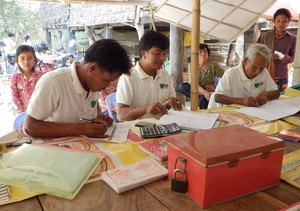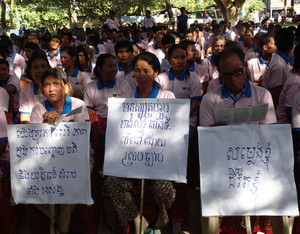ICC – PARCE Project
What is ICC – PARCE Project?
ICC – PARCE works toward the alleviation of poverty, in collaboration with villagers to meet their needs in relation to agriculture, community development and health via the group formation.
PARCE = Poverty Alleviation through Rural Community Empowerment

photo by PARCE Staff
Where are we located?
In the southeast of Cambodia where is located in Preah Sdach Distric, Prey Veng Province, bordering with Vietnam.
ICC – PARCE aims to build awareness about democratic institutions within the villages, particularly through modeling the operation of the Self-Help Groups. The increased opportunities for individual villagers, notably women, to assume leadership positions in Self-Help Groups will also provide the villagers with a greater pool of experienced leaders from whom to choose their representative. Training sessions on democratic process and the roles of the VDC, Village Chief, and Commune Councils will increase understanding at grassroots level.

photo by PARCE Staff
ICC-PARCE aims to deliver capacity building inputs that allow beneficiaries to maintain sustainable livelihoods in the project area. As an integral part of ICC’s exit strategy, all institutions established in the course of the project are designed either to become self-sustaining or to be linked to an ongoing form of support. Project interventions are designed to use natural resources in a sustainable manner through wise stewardship (e.g. reducing pesticide use, enhancing production through sustainable use of water, increased use of composting etc.).
What are the hopes of ICC – PARCE Project?
Our long term vision is to transfer the responsibility and ownership from the project team to Agriculture Cooperatives (ACs), and it will be done in a participatory way, with an emphasis on on-going reflection, learning and analysis.

photo by PARCE Staff We would love to see:
AC has a strong organizational structure including visible governance and transparency, which has secured the confidence and participation of the most vulnerable and marginalized.
AC has built a strong network with other partners and is active in working towards similar outcomes in collaboration.
AC is visible to and has a recognized voice within the Commune Council which allows them to confidently express the voice of their members.
AC is able to independently conduct training on issues relevant to their members.
AC has in place effective monitoring systems for its Self-Help Group, Agriculture Productive Group and Youth Unit sub-groups and has the capacity to provide technical assistance when required.
AC and its members do not have any political allegiance or are not subject to external political influence
AC has enough capital and income stability through membership to sustainably support its activities and those of its groups.
ACs are able to develop their own annual plans and seek to implement their own development plans through collaboration with partners.
